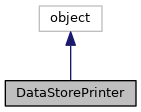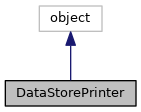 |
Belle II Software
release-05-02-19
|
 |
Belle II Software
release-05-02-19
|


Public Member Functions | |
| def | __init__ (self, name, simple, withArgument=None, array=True) |
| def | add_member (self, name, arguments=[], print_callback=None, display=None) |
| def | print (self) |
| def | print_untested (self) |
Public Attributes | |
| name | |
| class name of the datastore object | |
| array | |
| if True we print a StoreArray, otherwise a single StoreObjPtr | |
| object_members | |
| list of object members to call and print their results | |
Private Member Functions | |
| def | _printObj (self, obj, index=None) |
| def | _printResult (self, result, depth=0, weight=None) |
Class to print contents of a StoreObjPtr or StoreArray.
This class is inteded to print the contents of dataobjects to the standard
output to monitor changes to the contents among versions.
For example:
>>> printer = DataStorePrinter("MCParticle", ["getVertex"], {"hasStatus": [1, 2, 4]})
>>> printer.print()
will loop over all MCParticle instances in the MCParticles StoreArray and
print someting like ::
MCParticle#0
getVertex(): (0,0,0)
hasStatus(1): True
hasStatus(2): False
hasStatus(4): False
for each MCparticle
Definition at line 31 of file datastoreprinter.py.
| def __init__ | ( | self, | |
| name, | |||
| simple, | |||
withArgument = None, |
|||
array = True |
|||
| ) |
Initialize
Args:
name (str): class name of the DataStore object
simple (list): list of member names to print which do not need any additional
arguments
withArgument (dict or None): dictionary of member names and a list of
all argument combinations to call them.
array (bool): if True we print a StoreArray, otherwise a single StoreObjPtr
Definition at line 55 of file datastoreprinter.py.
|
private |
Print all defined members for each object with given index. If we print a StoreObjPtr then index is None and this function is called once. If we print StoreArrays this function is called once for each entry in the array with index set to the position in the array
Definition at line 145 of file datastoreprinter.py.
|
private |
Print the result of calling a certain member.
As we want the test to be independent of memory we have to be a bit careful
how to not just print() but check whether the object is maybe a pointer to another
DataStore object or if it is a TObject with implements Print().
Also, call recursively std::pair
Args:
result: object to print
depth (int): depth for recursive printing, controls the level of indent
weight (float or None): weight to print in addition to object, only used for
relations
Definition at line 196 of file datastoreprinter.py.
| def add_member | ( | self, | |
| name, | |||
arguments = [], |
|||
print_callback = None, |
|||
display = None |
|||
| ) |
Add an additional member to be printed.
Args:
name (str): name of the member
arguments (list or callable): arguments to pass to the member when calling it
If this is a callable object then the function is called with
the object as first argument and the member name to be tested as
second argument. The function is supposed to return the list of
arguments to pass to the member when calling. Possible return
valus for the callable are:
* a `list` of arguments to be passed to the member. An empty
`list` means to call the member with no arguments.
* a `tuple` of `lists <list>` to call the member once for each
list of arguments in the tuple
* `None` or an empty tuple to not call the member at all
print_callback (function or None): if not None a function to print
the result of the member call. The function will be called with
the arguments (name, arguments, result) and should print the
result on stdout without any additional information.
display (str or None): display string to use when printing member call
info instead of function name + arguments. If it is not given
the default output will be ``{membername}({arguments}):``
followed by the result.
Definition at line 94 of file datastoreprinter.py.
| def print | ( | self | ) |
Print all the objects currently existing
Definition at line 125 of file datastoreprinter.py.
| def print_untested | ( | self | ) |
Print all the public member functions we will not test
Definition at line 136 of file datastoreprinter.py.